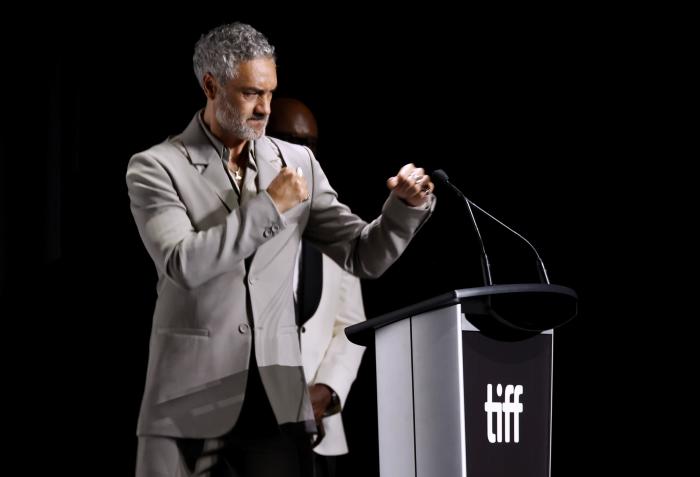By Allyson Johnson | Film | November 16, 2023

Taika Waititi’s Boy is a pivotal work in his filmography, a testament to his magnetic storytelling and a keen eye for nuanced details, both comedic and dramatic. While not his first feature (a title reserved for the now rightfully overlooked Eagle vs Shark), Boy arguably represents Waititi’s directing peak. Set in the Tairawhiti region of New Zealand in 2010, the film unfolds the life of an 11-year-old on a small farm with his grandmother, younger brother Rocky, and cousins. His imaginative musings about his estranged father collide with reality when the latter reenters their lives.
The film’s strength lies in its restraint, contemplative tone, and genuine hilarity derived from whip-smart dialogue and rhythmic character interactions. Waititi, donning the role of Boy’s father, Alamein, adeptly explores broader emotional terrain, especially when channeling the character’s roguish charisma. Boy’s idolization of Michael Jackson adds another layer, offering whimsical dream sequences that seamlessly transition into confrontational moments.
Despite the inherent whimsy, Waititi navigates the delicate landscape of grief through the lens of a child, juxtaposed with its impact on a parent. Rocky’s innocent belief in superpowers, stemming from his mother’s death in childbirth, adds a poignant layer to the narrative. The film retains humor in these moments without sacrificing the authentic heart in instances of levity— a style that initially captivated audiences.
However, recent years have seen Waititi veer off course, possibly losing sight of what distinguished his earlier works. The sanctimonious Jojo Rabbit, the irksome Thor: Love and Thunder, and the recently reviewed Next Goal Wins, criticized for lacking the expected depth, all point to a divergence from the nuanced balance of humor and pathos seen in his earlier films. This regression is disappointing given the brilliance evident in films like Boy, What We Do in the Shadows, Hunt for the Wilderpeople, and Thor: Ragnarok.
Waititi’s unique voice in these films was distinctive yet complementary to the overarching narrative. However, Thor: Love and Thunder dismisses serious storylines with casual quips, relegating grief to an afterthought. In contrast, Boy’s emotional impact, exemplified in pivotal moments like the father-son confrontation and Rocky’s rollerblading entrance, is integral to shaping our perception of the characters. Love and Thunder, on the other hand, exploits a major death for superficial amusement.
This lack of restraint extends to Waititi’s recent comedic endeavors. What We Do in the Shadows’ success lies in meticulous attention to detail and subtle humor, whereas Next Goal Wins mishandles sensitive topics, and Love and Thunder relies on excessive and exhausting jokes. The humor that once thrived on tonal shifts and visual gags now seems overshadowed. Whether Waititi needs a more discerning editor or misunderstands what audiences love about his films remains unclear.
Even in performances, a stark contrast emerges. The over-the-top, obnoxious portrayal in Free Guy pales in comparison to his nuanced work in Boy or Our Flag Means Death, where he consistently delivers career-best performances.
While a fall from social grace has seemingly transpired for Waititi, driven more by his public persona than his directorial abilities, the descent amplifies scrutiny on his projects. While Jojo Rabbit garnered an Oscar for Best Adapted Screenplay, dissenting voices criticized its tonal inconsistencies. Coupled with the lackluster Love and Thunder and the questionable humor in Next Goal Wins, Waititi urgently needs a triumphant creative endeavor beyond his television production work.
Boy, Hunt for the Wilderpeople, and What We Do in the Shadows exemplify a director who once seamlessly blended humor and heart in unexpected moments. Boy and
With Next Goal Wins facing some of the worst reviews of Waititi’s career, one can only hope this serves as a necessary wake-up call. His strength lies in his ability to seamlessly marry humor and heart without sacrificing one for the other—a reminder that, regardless of recent missteps, could guide his future projects back to their former brilliance.